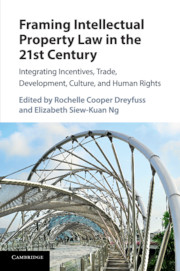
- Cited by 2
-
Cited byCrossref Citations
This Book has been cited by the following publications. This list is generated based on data provided by Crossref.
Kuznetsova, Tatiana V. and Tokareva, Anastasia A. 2022. Factors for Building an Intellectual Property Culture. Observatory of Culture, Vol. 19, Issue. 5, p. 452.
Upreti, Pratyush Nath 2024. Intellectual Property Responsibility: A Manifesto. IIC - International Review of Intellectual Property and Competition Law,
- Publisher:
- Cambridge University Press
- Online publication date:
- October 2018
- Print publication year:
- 2018
- Online ISBN:
- 9781316471647
- Subjects:
- Intellectual Property, Law, International Trade Law




